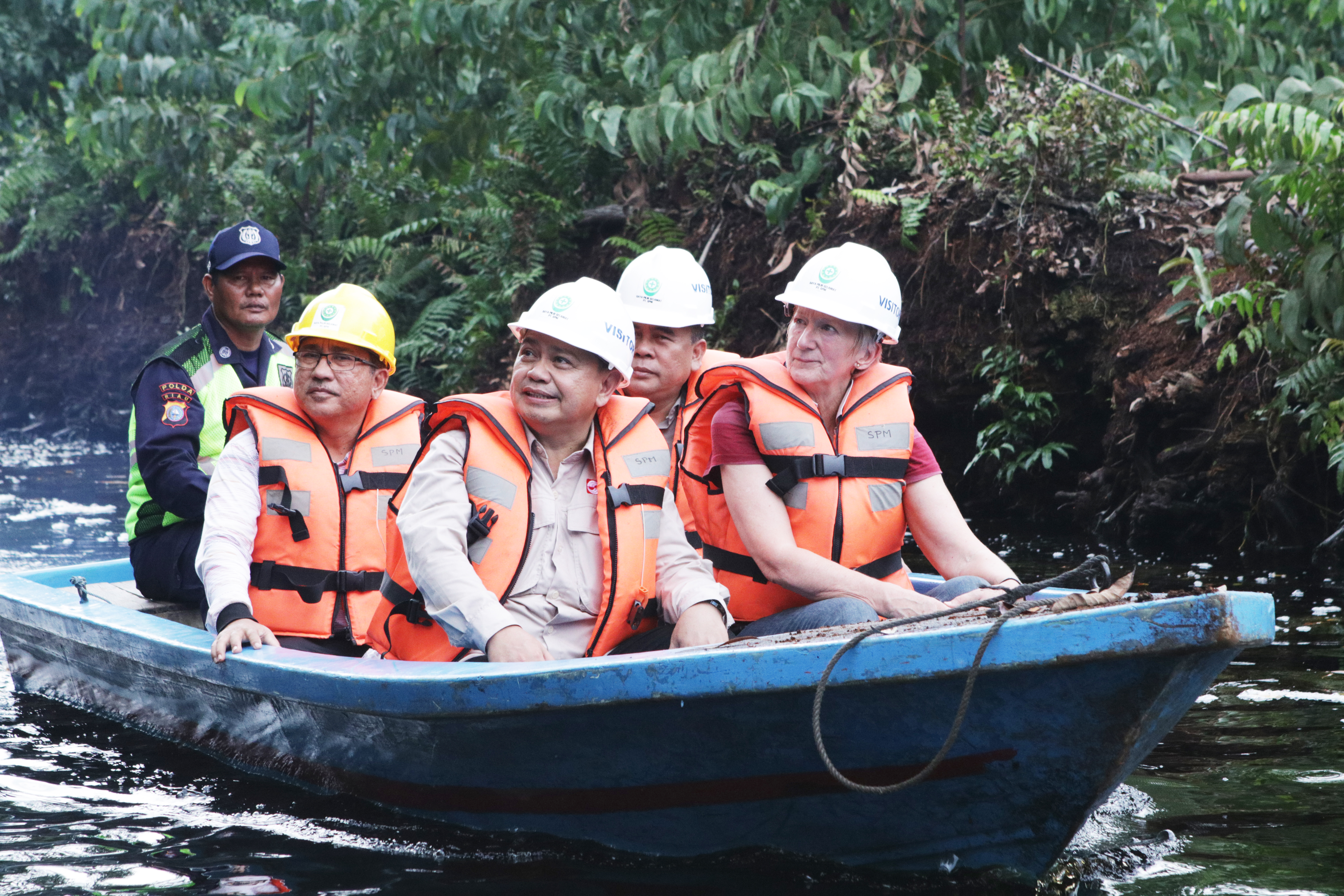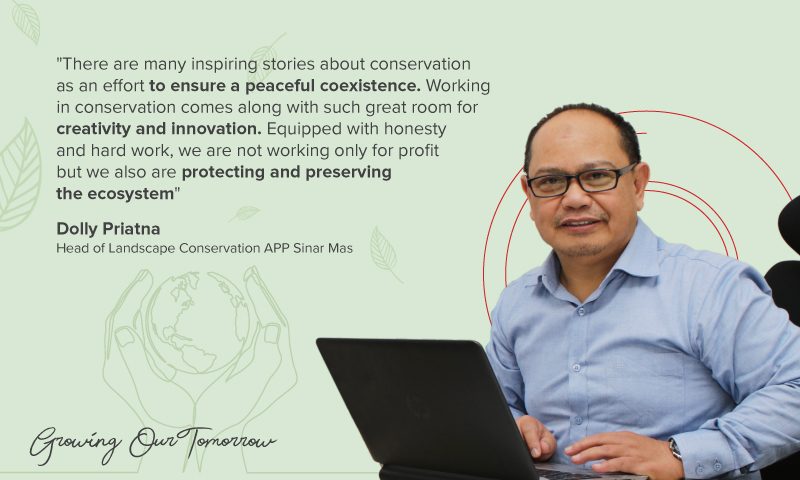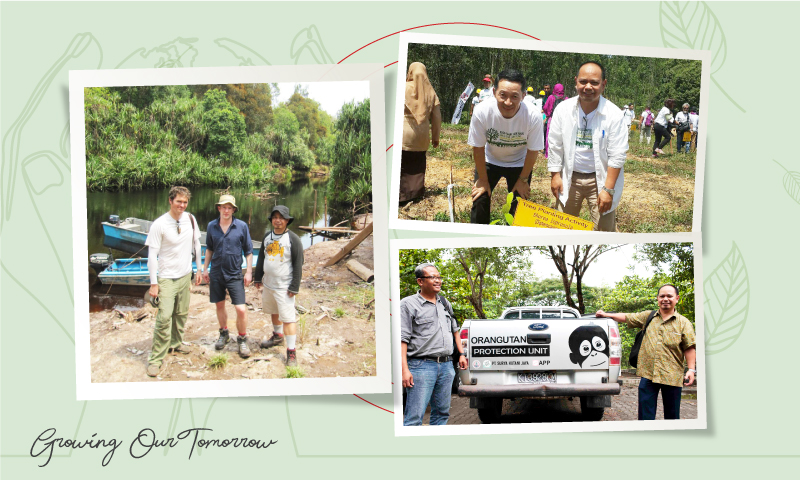 *)photo taken before pandemic
*)photo taken before pandemic
Maintaining a balanced ecosystem is one of the biggest challenges in conservation efforts. Living in harmony with nature needs a greater understanding from each one of us to play an important role that one holds. Unfortunately, not everyone understands the concept and moreover only few of us willing contribute directly to conservation. In Asia Pulp & Paper (APP) Sinar Mas, this is actually held as one of the commitments in running a sustainable business. Dolly Priatna is one of the figures behind the ongoing conservation efforts.
Q: As an expert conservation practitioner and as The Former Head of Landscape Conservation of APP Sinar Mas, how did you get interested in exploring the field of conservation?
A: Since I was in high school, I liked biology more than any other subjects. Then, I entered the Faculty of Biology, National University in Jakarta and my hobbies during college were related to outdoor activities such as camping, exploring nature and mountain climbing. I was also a member of the Biological Science Club community, which often conducts surveys and research on flora and fauna in many forests around the island of Java and its surrounding islands. From these various activities, I got to know many people and heard stories from seniors about their research and experiences in participating in international conservation projects. Their stories have inspired and encouraged me to do the same.
Q: Was it common to work in the conservation field at that time? Or were there certain challenges experienced?
A: The first offer, as well as my first experience getting directly involve in the field, was in 1989, where I went to Kalimantan (Borneo) for six months to observe the behavior of wild orangutans. Since then, I often assisted researchers from international conservation projects. I started my career as a researcher at the Ecological Project of Wildlife Conservation Society. In Indonesia, not many people are interested having a career in nature conservation. As far as I knew at that time, the professions generally were as environmental consultants, working in Non-Governmental Organizations (NGOs) for conservation, researchers at the Indonesian Institute of Sciences (LIPI), or as teachers or lecturers. Not many available career options at that time.
Q: If it is said that your career choices tend to be limited at that time, then what made you persist and want to work in the conservation field?
A: In general, conservation is the art of preserving biodiversity. Indonesia is one of the world’s richest nations in terms of its biodiversity, both flora and fauna because it is located in the tropical region. Many types of flora and fauna can be found only in Indonesia and not anywhere else in the world. Every single living thing is part of an ecosystem, has its own role, and we as humans have a responsibility to keep it balanced. In the current condition we need to adhere to the principle of coexistence. I want to contribute to conserve nature, taking part of it with the knowledge that I get through formal education as well as the inspiration and experiences from a lot of people I have met.

Q: Prior to joining APP Sinar Mas, you mentioned that you worked for a non-profit organization (or NGO) that strongly prioritizes environmental issues. It is interesting, because a career path like yours is not common to most people. How was the initial experience like when you entered the company or corporation? What are the challenges and how to overcome them?
A: I joined APP Sinar Mas since December 2012 which is my third place to work, after having around 22 years’ experience in conservation projects and NGOs. It's true, there are various views and opinions from my friends, knowing the fact that I moved to a company/corporation. However, it turns out that many of my friends support my decision to move and join a corporation. I personally think that there are other perspectives that need to be seen, especially from forest management, with focus on production forests. There is a social dimension where we need to pay serious attention, especially the livelihoods and economics of people who are residing in and near forests, in which we can help and assist them to understand the principles of profitability and sustainability in responsible forestry according to sustainable guidelines. I prefer to be directly involved to provide advice on the basis of conservation, as well as develop conservation program that are suitable for the company. In fact, social and economic problems cannot be separated. Therefore, it is my job and the team to find innovative solutions on the ground to protect wildlife and their habitat across our suppliers’ concession areas, to ensure a peaceful coexistence. Meanwhile, for the social aspect, we coordinate closely with other divisions within APP Sinar Mas.
Q: It’s a big decision, especially with the existing stigma, where not only you move to a new place to work, but also join a company that has very different interests. You mentioned earlier about the importance of maintaining balance. What makes you confident that you can bring about that change?
A: Back in 2010 when I was the Country Director for Zoological Society of London (ZSL) Indonesia, a conservation organization, I attended a discussion about conservation held by one of the largest conservation NGOs in Indonesia. At the event, I met with one of the top managements in Sustainability at APP at the time and we discussed a lot about APP. Long story short, after I finished my doctoral studies at Bogor Agricultural University (IPB) in 2012, I learned that APP was preparing to launch a Forest Conservation Policy (FCP). Learning about FCP, I became interested in being directly involved in supporting and helping companies that have good intentions towards the environment and conservation. I want to contribute and participate directly to provide solutions and am very grateful to be given the opportunity and the trust for me to lead, develop and innovate suitable and better conservative programs along with the team.
 *)photo taken before pandemic
*)photo taken before pandemic
Q: Speaking of roles within the team, how do you keep the work done effectively? Considering that conservation efforts tend to be carried out more in the field than in the office.
A: Indeed, conservation activities are generally carried out in the field, but our program planning is done in the office which we then consult with the team in the field. As I have longer experience working in NGOs, I'm used to put together the team from planning team who are in the office to the field team, thus the team will feel close to each other and we can have open discussions to solve any kind of problems. When I joined APP and entrusted as a leader, I always try to set the best example for the team, to put it in another way, lead by example. I also always ask the team to give their views and opinions if they have new ideas or innovations in conservation programs. Although I have worked longer and have more experiences, I don't think I know everything, thus, I realise that the team who involve directly in the field might know better. I always schedule regular visits to meet with the team, listening to their stories, experiences and ideas, starting from the difficulty of installing camera traps to mitigating the conflict between people, the community, and wildlife. On the other hand, build and earn trust is also needed if we are working in conservation. Due to experience and able to maintain professional network, I am grateful that it allows me to establish cooperation with various stakeholders.
Q: What message would you like to share with other people regarding conservation? Why is it important to be directly involved in maintaining the balance of nature or coexistence?
A: We need to be grateful to live in Indonesia, with its strategic location and unique ecosystems containing a large number of diverse species, many can get firsthand experience with endangered species. God created a balanced ecosystem and assigned each one of them with their respective roles. At APP, we protect three species of wildlife, namely the Sumatran Tiger, Sumatran Elephant and Orangutan. These three animals also live side by side around our concession area.
As top predators, wild tigers play an important role in maintaining the harmony of the forest ecosystems. By controlling the population of other animals, tigers help to keep the balance between the prey animals and the forest vegetation which they feed upon and help farmers who live around the forest to reduce plant pests.
Whereas, orangutans are the agent in seed dispersal in their habitats. They spread the seeds of various plant species in the forest, thus making rich diversity of flora in the forest and prevent extinction. While elephants, due to its large posture, they can open space in the forest that allow seeds to germinate and grow into trees.
Then there are forests products and foods from trees and plants that we can consume directly and those that are used as raw materials for medicines. Forests goods are a rich reserve of compounds that can be used as pharmaceuticals. There are still many interesting stories that we can explore when we talk about conservation as an effort to create peaceful coexistence. Working in conservation allows us to have space for creativity and innovation. Equipped with honesty, consistency and hard work, we are not working only for profit, but we are also protecting and preserving the ecosystem.
.jpg/0a625d16-64a9-d285-4873-5d62918f59c7/)

